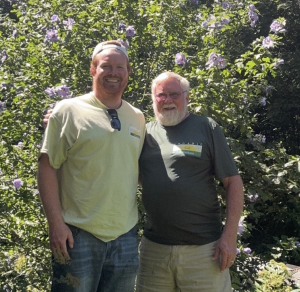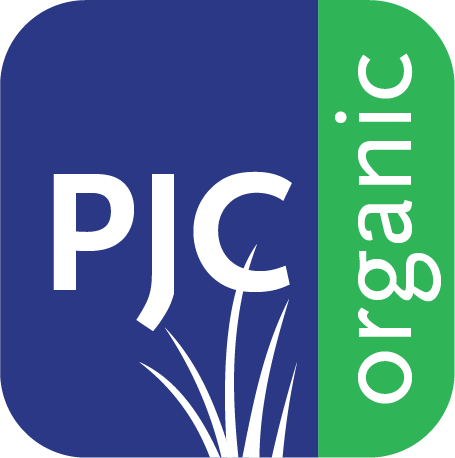About Organic Soil Solutions: Pioneers in Organic Lawn Care
 What stands out about Organic Soil Solutions is their dedication to putting soil health at the heart of lawn care. Based in Acton, MA, they’ve been an all-organic company serving the Boston & Greater Boston Area since 1999. In step with PJC’s approach, Organic Soil Solutions focuses on revitalizing the soil to support healthy lawns, trees, and shrubs. Their philosophy is simple but powerful: if you want a thriving landscape, you have to start from the ground up.
What stands out about Organic Soil Solutions is their dedication to putting soil health at the heart of lawn care. Based in Acton, MA, they’ve been an all-organic company serving the Boston & Greater Boston Area since 1999. In step with PJC’s approach, Organic Soil Solutions focuses on revitalizing the soil to support healthy lawns, trees, and shrubs. Their philosophy is simple but powerful: if you want a thriving landscape, you have to start from the ground up.
Here, PJC chats with Mike Murray (former owner) and James Murray (Mike’s son & current owner).
From Finance to Fertilizer: Mike’s Journey into Organic Landscaping
How did you get started in the landscape industry?
Mike: I was in finance and operations at the American Academy of Arts and Sciences. We hired Boston Tree Preservation to do some work. Having an interest in organics, I asked if they knew of any small companies for sale. They had a little lawn care division they were thinking of spinning off. I hired them to care for the lawn at my house and joined the team. Then, I noticed that trees and shrubs fared better on properties not treated with synthetic lawn chemicals. I managed Soil Solutions for a year and in 2003, I took the leap and bought the company, and we’ve been helping landscapes thrive organically ever since.
Why organic?
Mike: around 1970, when I was in college, I attended the first Earth Day and organic methods really piqued my interest. I eventually quit school to live at a farmhouse and start an organic garden. I was reading info from the Rodale Institute and really got into it.
Passing the Torch: James Murray’s Role in Business Growth
James, how did you get involved in the business?
James: I would help during the summers in middle and high school. Once I graduated high school, I took a semester off and worked full time before going to college. I went to UMASS Amherst for 1.5 years, undeclared and took general courses, which I wasn’t enjoying. I talked with my dad and he asked, “Did you enjoy working with me this summer? “” Yeah, I loved it.” “Then why don’t you go to Stockbridge School of Agriculture, located on the UMass Amherst campus, and study Landscape Contracting?”. That’s the route I went and really enjoyed it. After graduating, I started working full time for the business. This is my 15th year.
How Organic Soil Solutions Has Evolved Over Time
How did the company change once James joined full time?
Mike: Truthfully, when James was in college, a professor said ‘The reason you’re here is so you don’t end up behind a lawn mower your whole life’. Although, when he graduated, I had nobody to mow lawns. So, the first two years, all he did was mow.
I had no idea that he knew so much about construction and project management. So, he started doing some projects, and we started buying more equipment. He was leading those projects and knew what he was doing. It was wonderful; it was an eye-opener.
In the beginning, we were focused on organic fertilization and mowing, and doing some projects — the project side really took off when James showed up.
James: At UMASS I was in the landscape Contracting program, where I learned about design and plants. It wasn’t focused on organic lawn care. Once I got out, as the lawn care has grown, we’ve had to hire more full time employees, enabling us to do more projects. We fill in with the basics of landscaping (mulching, clean ups, etc.). We work with designers and incorporate their plans, or work directly with customers for plant installations.
The lawn care is still the backbone of the company, and what feeds our other work. We’ve been able to diversify our service offerings to fill in the slow times.
Business Growth and Service Diversification
What’s your customer base like?
James: We started with about 170 customers, and now have around 700. About half are lawn care, and the other half are a combination of landscape construction, hardscape, tree, etc. Our customer base is very spread out with a wide range of lawn sizes. From Boston/Newton with properties mostly under 5000 square feet to the Concord area, where they’re over 5,000, up to 20,000 square feet.
How many employees did you start with; how many do you have now; and how are you finding them?
Mike: We started with just me and two other employees. Now, we have about 13-15, depending on the time of the season. There are a couple father/son employees or cousins. Mostly, we find help from our current employees through word of mouth.
You’ve been in the organic turf care space for a long time — how has your approach changed over the years?
Mike: Over the years, I became more knowledgeable, but I would say our approach is still the same. We believe in improving the soil — it’s that simple. If you have problems, it’s usually because you have poor soil and need to top dress or incorporate amendments. We use 6-0-6 during the season and CHARGE-S3 in the fall. The name of our company is “Organic Soil Solutions”, so sometimes I’ll tell people: “You know, we’re not really a lawn company. We’re a soil company. We’re always trying to improve the soil and make the soil biology more active.”
What is your biggest challenge?
James: The biggest thing people complain about is crab grass, but it also just kind of happens when lawns are burning out. People tend to complain in the summer, and then in the fall things bounce back; that’s rewarding and the customers appreciate it.
Managing Weeds and Pests Naturally
How do you manage weeds and pests?
Our philosophy is that clover is not a weed; it comes and goes, it is good for the soil. Crab grass, we like to improve the soil, and plant more grass, the only time you can really do anything about it is in the Fall. Dandelions, we’ve done all sorts of different things, but in general, we improve the soil. Our organic lawn care customers are more forgiving. Communication is key – every time we visit a site, we send a letter to explain our philosophy and how nature is providing for your lawn the way it should. We do a lot of seeding in the fall. It seems like everything comes up when the weather changes; it always seems to work out in the fall.
The Power of Soil Testing and Lawn Recovery
What about soil testing? Do you guys soil test your lawns?
We take a soil test for all new customers, and then generally every three years after that. If the pH is below 6, we’ll test it consecutive years until we can get it to an optimal level. That’s another thing that can be rewarding; you see it improve every couple years and it makes you feel like you’re making a difference.
Tips for Starting Out in Organic Turf Management
Any success stories to share?
James: Some of our biggest success stories have been on lawns that another company installed, and then the following year, the homeowner reaches out for help. We go, and the soil is typically really compacted or no organic matter. Then, we’re able to incorporate all the nutrients with our organic program, and things really turn around.
Another is electric mowing — two years ago, we made the switch to all electric lawn mowing (mowers, trimmers, and blowers). As towns have started to put restrictions on gas equipment, we have tried to be ahead of the curve. It hasn’t been all smooth sailing, but the advancements in technology in just the past two years have been amazing. I’m so excited to see where this goes, and we are happy to be on the cutting edge of this side of the industry
What’s Next for Organic Soil Solutions
Words of wisdom for someone entering the organic turf care arena?
James: soil testing, aerating, improving organic matter, and grass seed make all the difference in the world. Additionally, proper mowing practices…We mow 60-70 accounts. We leave the clippings and mow high. We don’t always have that option if they hire someone else to do it. That’s always a challenge; yards get scalped and don’t grow deep roots and then they wonder why they have weeds. A lot of our best lawns are ones that we mow, because generally we’re cutting higher than other companies (3.5 inches).
Mike: Someone told me, ‘Every hour you’re in the field, you’re losing money because you’re not growing the business’. And it’s true; you can get behind if you’re out working all day and then come home at night and try to work.
What’s your vision or growth plan moving forward for your company?
We’re in a pretty comfortable spot. We’ve grown every year, and then hit a bit of a plateau, then another growth spurt. Now it feels comfortable. Every year, you get a couple of new opportunities to grow in one way or another. We have a good crew that knows what they’re doing, so it’s able to run itself smoothly. 700 lawn care customers is enough, because it’s seasonal. The rest of the year it’s kind of easy.
Mike, how involved are you now?
Mike: I’m not. I go over to the shop every once in a while and get in the way 🙂 I still write the customers letters to keep expectations in check — they know that we have their best interests at heart and we’re really dedicated to doing what we do.
Any advice to family-owned businesses?
We’re both pretty laid back, so we don’t bother each other too much. I’ve always enjoyed it and haven’t had issues.
This month’s customer spotlight, Organic Soil Solutions, is based in Acton, MA. For more information on their lawn care & renovation, soil drench beds, planting, and stone walks, visit their website.
